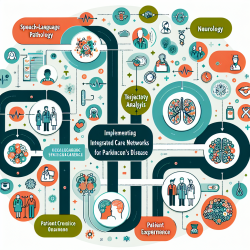Aphasia, a language disorder often resulting from brain injury such as a stroke, poses significant challenges in speech comprehension for affected individuals. Recent research has illuminated the potential of temporal information processing (TIP) as a transformative approach to ameliorate these deficits. For practitioners in the field of speech therapy, understanding and implementing the outcomes of this research can significantly enhance therapeutic interventions.
The Role of Temporal Information Processing
TIP refers to the brain's ability to process and sequence auditory information over time. This capability is crucial for understanding rapid speech sounds and is often impaired in individuals with aphasia. The study titled "The Treatment Based on Temporal Information Processing Reduces Speech Comprehension Deficits in Aphasic Subjects" highlights how targeted TIP training can lead to improvements not only in temporal sequencing abilities but also in overall language comprehension.
Key Findings from the Research
- The study involved 14 post-stroke aphasic patients who underwent eight sessions of specific temporal treatment aimed at improving their perception of sequencing abilities.
- The temporal treatment group showed significant improvements in TIP, as evidenced by lowered temporal order thresholds (TOT), which translated into better speech comprehension.
- This improvement was not observed in the control group that received non-temporal volume discrimination training.
Implementing TIP in Therapeutic Practice
For practitioners looking to integrate TIP into their therapeutic repertoire, consider the following strategies:
- Incorporate TIP Exercises: Design exercises that focus on recognizing and sequencing auditory stimuli. This could involve tasks where patients identify the order of tones or distinguish between different phonemes presented rapidly.
- Create Adaptive Learning Programs: Use adaptive algorithms to tailor difficulty levels according to individual patient progress, ensuring that exercises remain challenging yet achievable.
- Monitor Progress with Language Tests: Employ standardized tests like the Token Test or Phoneme Discrimination Test (PDT) to assess improvements in speech comprehension post-intervention.
The Broader Implications for Neurorehabilitation
The success of TIP-based interventions underscores its potential as a cornerstone of modern neurorehabilitation. By focusing on non-verbal auditory processing, patients may experience less anxiety about their language deficits while still achieving meaningful improvements in speech comprehension. This approach not only supports traditional speech therapy but also opens new avenues for research and development in therapeutic techniques.










